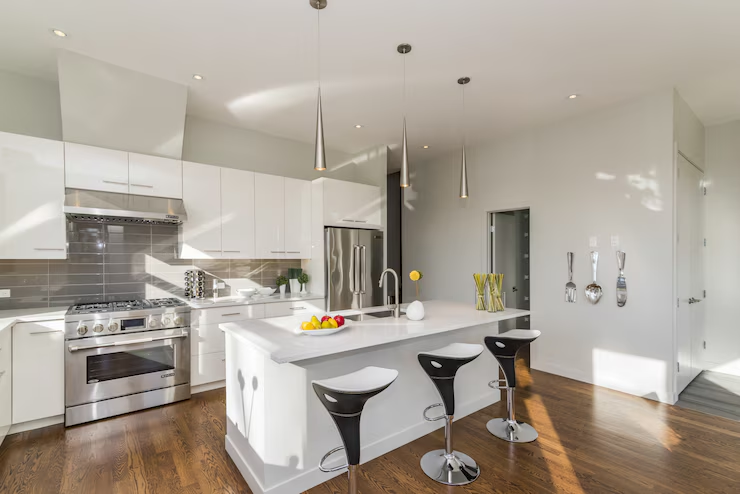Renovate a kitchen takes an average of four to six weeks, depending on the complexity of the project and the availability of contractors. During this time, old fixtures and appliances are removed, walls might be knocked down, plumbing and electrical work may be done, and new cabinets, countertops, and flooring are installed.
It is crucial to plan accordingly and allocate sufficient time for the renovation process to avoid rushing and compromising on quality. A well-executed kitchen renovation can transform the heart of the home and increase its functionality and value.

Credit: www.inspirehomes.ca
Factors Affecting The Timeline
Renovating a kitchen is an exciting project that can transform the heart of your home. It’s no surprise that one of the most common questions people have when considering a kitchen renovation is: how long will it take? The timeline for a kitchen renovation can vary depending on several factors.
Let’s dive into the key considerations that can affect the duration of your kitchen remodeling project:
Size Of The Kitchen
The size of your kitchen plays a significant role in determining how long the renovation will take. Larger kitchens tend to require more time for demolition, installation, and finishing touches compared to smaller ones. Here are a few key points to consider:
- A small kitchen with minimal square footage may take around 1 to 2 weeks to complete.
- Medium-sized kitchens typically range between 2 to 4 weeks, considering the complexity of the project.
- Large kitchens, with their extensive cabinetry, countertops, and appliances, can take 4 to 6 weeks or longer, depending on the intricacy of the design.
Scope Of The Renovation Project
The scope of your kitchen renovation project directly impacts the timeframe as well. Are you planning a complete overhaul or only making minor updates? Here’s what you need to know:
- Minor cosmetic updates, like painting cabinets and replacing hardware, can be completed in as little as a few days to a week.
- Partial renovations, such as replacing countertops and upgrading appliances, generally range from 2 to 4 weeks.
- Extensive renovations involving structural changes, relocating plumbing or electrical, and installing custom features may take anywhere from 6 weeks to several months.
Demolition And Removal Of Existing Materials
Before the reconstruction begins, the existing kitchen needs to be demolished and all materials removed. This phase can significantly impact the overall timeline. Consider the following points:
- Demolition typically takes a few days to a week, depending on the complexity and size of the kitchen.
- Proper disposal and removal of debris should also be factored into the timeline.
Planning And Design Phase
The planning and design phase is crucial to ensure a successful kitchen renovation. It involves selecting materials, finalizing layouts, and coordinating with professionals. Here’s what you should know:
- Designing your dream kitchen may take a few weeks, especially if you need to consult with an architect or designer.
- Planning for custom features, specialized materials, or unique layouts may require additional time.
- The complexity of your design choices and the availability of materials can impact the timeline.
Procuring Materials And Hiring Contractors
Sourcing the necessary materials and hiring skilled contractors can have a direct influence on the duration of your kitchen renovation. Consider these key points:
- Ordering materials and waiting for delivery can take several weeks, especially for custom-made items.
- Hiring reliable and experienced contractors may require additional time to ensure you find the right professionals for the job.
- Poor contractor availability or delays in material procurement can extend the overall timeline.
Permitting And Inspections Process
Depending on your location and the extent of your renovation, you may need to obtain permits and undergo inspections. Here are a few important factors to consider:
- Permitting requirements can vary, but it’s essential to allocate time for the application process, which may take a few weeks.
- Inspections at different stages of the renovation can add extra time, but they are necessary to ensure compliance with building codes and regulations.
Unexpected Issues Or Delays
It’s essential to be prepared for unexpected issues or delays that may arise during a kitchen renovation project. Here’s what to keep in mind:
- Unforeseen problems, such as water damage, structural issues, or electrical complications, can extend the timeline.
- Weather conditions, unforeseen emergencies, or unforeseen personal circumstances can also cause delays.
While it’s impossible to predict every obstacle, understanding these key factors can help you anticipate the timeline for your kitchen renovation project. Remember to plan accordingly, allocate extra time for unexpected delays, and consult with professionals to ensure a smooth and successful renovation journey.
Planning And Design Phase
Renovating a kitchen is an exciting and transformative process, but it requires careful planning and design. This phase is essential to ensure that the end result meets your expectations in terms of layout, functionality, and aesthetic appeal. Let’s explore the key aspects of the planning and design phase to help you understand how long it might take to renovate your kitchen.
Consultation With A Professional Designer
- Engaging the expertise of a professional designer can be highly beneficial for your kitchen renovation project. They bring a wealth of knowledge and experience to the table, allowing you to make informed decisions. During the consultation, you can discuss your vision, preferences, and budget with the designer.
- The designer will assess your kitchen space, taking note of any limitations or structural considerations. They will then provide expert guidance on the feasibility and practicality of your ideas, offering creative solutions to maximize functionality and aesthetics.
Determining The Desired Layout And Functionality
- Before diving into materials and finishes, it’s important to determine the desired layout and functionality of your kitchen. Consider factors such as workflow, storage needs, and entertaining requirements. Do you need a spacious island? Would you like a separate pantry area? Take the time to envision your ideal kitchen and prioritize the elements that matter most to you.
- Collaborate with your designer to explore different layout options that align with your vision. They will present you with design concepts and floor plans that optimize the available space while accommodating your requirements. This phase may involve several iterations until you arrive at the perfect layout for your kitchen.
Selecting Materials, Appliances, And Fixtures
- The selection of materials, appliances, and fixtures plays a significant role in the overall look and functionality of your kitchen. From cabinetry and countertops to flooring and lighting, every choice contributes to the aesthetics and practicality.
- Work closely with your designer to explore various options that suit your style and budget. They can provide recommendations based on durability, maintenance, and design trends. Keep in mind that sourcing materials might require additional time, especially if you opt for custom-made elements or unique finishes.
Preparing A Detailed Timeline And Budget
- Once the consultation, layout, and material selection are finalized, it’s crucial to prepare a detailed timeline and budget for your kitchen renovation. This step helps you stay organized and on track throughout the process.
- Your designer will work with you to create a realistic timeline that considers any necessary permits, delivery lead times, and the availability of contractors. This timeline should outline each phase of the renovation, from demolition to installation, giving you a clear idea of how long the project will take.
- In terms of budget, your designer will help you establish a realistic estimate by factoring in the cost of materials, labor, and any additional services required, such as electrical or plumbing work. This ensures that you have a clear understanding of the financial commitment involved before proceeding with the renovation.
Remember, the planning and design phase is a crucial step in the kitchen renovation process. It sets the foundation for a successful project and helps minimize any unexpected surprises along the way. By working closely with a professional designer and carefully considering the layout, materials, and budget, you can create a kitchen that not only meets your needs but also reflects your personal style.
Demolition And Removal
Clearing Out The Kitchen
Before you can begin the process of renovating your kitchen, the first step is to clear out the space completely. This includes removing all appliances, cabinets, countertops, and fixtures. Here are the key points to consider during the demolition and removal phase:
- Empty the cabinets and remove all the items stored inside. This will provide you with a clear workspace and prevent any damage to your belongings during the renovation process.
- Take down any shelving units that are fixed to the walls and remove any decorative items, such as art or plants.
- If you have a pantry or walk-in storage area, make sure to remove all items from there as well.
- Disconnect and remove any appliances, such as the refrigerator, stove, dishwasher, and microwave. These can be heavy, so it may be helpful to have assistance when removing them.
- Consider hiring professionals to handle any plumbing or electrical connections to ensure they are properly disconnected and removed.
- Don’t forget to turn off the electricity in the room before removing any electrical items or fixtures.
Disassembling And Removing Cabinets And Countertops
Once the kitchen is cleared out, the next step is to focus on removing the cabinets and countertops. This can be a time-consuming process, but with some planning and effort, it can be done efficiently. Here are the important points to keep in mind:
- Begin by removing the cabinet doors and drawers. This will make it easier to access the cabinet frames for removal.
- Carefully disassemble each cabinet section, starting from the top and working your way down. Take your time to avoid damaging the walls or any surrounding structures.
- Use a pry bar or screwdriver to loosen the cabinets from the walls, taking care not to damage the drywall or backsplash.
- Once the cabinets are removed, you can proceed to remove the countertop. Depending on the material, this may involve unscrewing or prying it off the base cabinets.
- Be cautious with any fragile or delicate countertops, such as granite or marble, as they can crack or chip easily if mishandled.
- Dispose of the cabinets and countertops responsibly, either by donating them if they are in good condition or arranging for proper disposal.
Removing Appliances And Fixtures
In addition to cabinets and countertops, it is crucial to remove any appliances and fixtures that will not be used in the new kitchen design. Here’s what you need to know:
- Start by disconnecting and removing the sink, including any plumbing connections. It may be necessary to turn off the main water supply before doing so.
- Remove any light fixtures, such as overhead lights or pendant lights, as well as switches and outlets.
- Consider hiring a professional to deal with gas lines and remove a gas stove or oven if necessary.
- Don’t forget to remove any flooring or tiles that need to be replaced as part of the renovation. This may involve scraping off old adhesive or breaking up the tiles.
Dealing With Electrical And Plumbing Connections
When renovating a kitchen, it’s essential to address any electrical and plumbing connections to ensure they meet the new design requirements. Here are the key considerations:
- Hire a licensed electrician to handle any electrical work, such as rewiring or installing new outlets and switches.
- Ensure that the electrical connections are up to code and are compatible with the new kitchen layout.
- For plumbing connections, it may be necessary to reroute pipes or install new ones for sinks, dishwashers, and other water-related fixtures.
- Coordinate with a plumber to make sure all plumbing is properly connected and functional in the new kitchen.
- Don’t forget to have the electrical and plumbing work inspected and approved before proceeding with further renovations.
By following these guidelines for the demolition and removal phase of your kitchen renovation, you can ensure a smooth and efficient process. Remember to take your time, prioritize safety, and consult professionals when necessary.
Construction And Installation
Renovating a kitchen involves several construction and installation stages. From structural changes to installing appliances and fixtures, each step requires careful planning and execution. Let’s dive into the key points of each phase:
- Structural changes, if any: If you’re considering a major kitchen transformation, structural changes may be necessary. This can include knocking down walls, adding or removing windows, or creating openings for new doorways. Keep in mind that structural changes usually involve permits and professional expertise to ensure safety and compliance.
- Plumbing and electrical work: As you renovate your kitchen, it’s crucial to update the plumbing and electrical systems to meet your new design and functionality requirements. This may involve relocating sinks, faucets, and dishwashers, as well as rerouting electrical wiring for lighting, appliances, and outlets.
- Installation of cabinets, countertops, and backsplash: After the structural and utility-related work is completed, it’s time to focus on installing the core elements of your kitchen. The following steps are involved:
- Cabinets: Start by measuring and designing your cabinets according to your kitchen layout and storage needs. Once the cabinets have been built or purchased, they will be installed and secured to the walls.
- Countertops: Choose your desired material (such as granite, quartz, or laminate) and finalize the measurements. The countertops will be cut and fitted to match your kitchen’s dimensions, followed by installation and sealing.
- Backsplash: Enhance the visual appeal and protect your kitchen walls with a stylish backsplash. From classic subway tiles to mosaic designs, the backsplash is applied above the countertops and below the cabinets.
- Flooring installation: The flooring in your kitchen plays a vital role in both aesthetics and functionality. Depending on your preference and budget, options like hardwood, laminate, tile, or vinyl can be considered. The installation process involves removing the existing flooring, preparing the subfloor, and laying down the new material.
- Painting or wallpapering: To add the finishing touches to your newly renovated kitchen, you may choose to paint the walls or apply wallpaper. Opt for colors and patterns that complement the overall theme and design of your kitchen. Begin by preparing and priming the walls, followed by applying the paint or wallpaper in a professional manner.
- Installing appliances and fixtures: Your kitchen renovation isn’t complete without the installation of appliances and fixtures. From stoves and refrigerators to sinks and faucets, ensure that each component is properly installed and functional. Seek the assistance of professionals for gas, plumbing, and electrical connections to ensure safety and compliance.
Renovating a kitchen involves a series of construction and installation stages, each serving to bring your vision to life. By carefully planning and executing these phases, you can transform your kitchen into a functional and aesthetically pleasing space that meets your needs and preferences.
Finishing Touches
Renovating a kitchen can be an exciting but time-consuming process. After all the major work is done, it’s time to put the finishing touches on your newly transformed space. This is the stage where your kitchen starts to really come together and reflect your personal style.
Let’s explore the key points to consider during this phase:
Finalizing Details And Touch-Ups
During this phase, you’ll want to take a step back and evaluate your kitchen’s overall look. Make sure that all the intricate details are in place and match your vision. Here are some important aspects to focus on:
- Finalize paint or wallpaper: Confirm that the paint or wallpaper has been applied smoothly and evenly throughout the kitchen. Look for any spots that may require touch-ups.
- Inspect cabinetry and countertops: Check for any imperfections or uneven edges. Ensure that all handles and pulls have been installed correctly.
- Assess lighting fixtures: Verify that all light fixtures are functional and properly aligned. Ensure that the lighting design enhances the overall ambience of the kitchen.
- Check flooring and tiles: Take a close look at the flooring and tiles to see if any adjustments or touch-ups are needed.
Installing Hardware And Accessories
The right hardware and accessories can add the perfect finishing touch to your kitchen renovation. Here’s what you need to consider:
- Cabinet hardware: Install knobs, handles, or pulls that match your kitchen’s style. Ensure that they are securely affixed.
- Faucets and sinks: Install your chosen faucet and sink, ensuring proper plumbing connections and leak-free operation.
- Appliances: Place and connect your appliances, making sure they are functional and properly positioned.
- Window treatments: Hang curtains, blinds, or shades to add privacy and style to your kitchen.
Cleaning Up The Workspace
As you near the end of your kitchen renovation, it’s essential to tidy up the workspace. The final clean-up ensures that your kitchen is ready to be enjoyed. Here’s what you should do:
- Wipe down surfaces: Clean countertops, cabinets, appliances, and flooring to remove any dust or debris.
- Remove construction waste: Dispose of any leftover materials, packaging, or debris from the renovation process.
- Sweep and mop: Give the entire kitchen a thorough sweep and mop to leave it sparkling clean.
- Polish and shine: Apply any necessary polish or cleaning agents to bring out the best in your kitchen surfaces.
Checking For Any Last-Minute Adjustments
Before you can fully enjoy your newly renovated kitchen, it’s important to double-check everything. Take the time to inspect and make any necessary adjustments to ensure everything is perfect:
- Assess functionality: Test all appliances, plumbing fixtures, and electrical outlets to ensure they are working as intended.
- Check for potential issues: Look for any signs of damage, loose connections, or leaks that may have been missed during the renovation.
- Evaluate organization: Make sure that all storage solutions are functional and that items are easily accessible.
- Make necessary tweaks: Address any small adjustments, such as leveling cabinets or adjusting hardware alignment, to achieve the desired aesthetic.
Remember, the finishing touches are what truly make your kitchen renovation feel complete. Take the time to add those final details, and soon you’ll be ready to enjoy your brand-new kitchen space.
Permitting And Inspections
Renovating a kitchen involves more than just picking out new countertops and appliances. It also requires obtaining necessary permits and undergoing inspections to ensure the work meets building codes and regulations. This process can add time to your project timeline, but it is essential for ensuring the safety and compliance of your kitchen renovation.
Submitting Permit Applications
Before you can begin your kitchen renovation, you will need to submit permit applications to the appropriate local government authorities. This step ensures that your plans comply with building codes and regulations. Here are the key points to keep in mind when submitting permit applications:
- Research the requirements: Each jurisdiction has its own set of regulations and documentation requirements. Familiarize yourself with the local regulations before filling out the application.
- Complete application accurately: Make sure to fill out all the necessary information on the application form correctly. Incomplete or incorrect applications can result in delays or rejection.
- Include necessary documents: Attach any required supporting documents, such as architectural plans, contractor licenses, and proof of insurance, to the application.
- Pay fees: Most jurisdictions require an application fee to process your permit. Ensure that you include the appropriate payment.
Scheduling Inspections At Various Stages
During the renovation process, inspections will be necessary to assess the work at various stages. These inspections help ensure that the work is being done correctly and up to code. Here are the key points regarding scheduling inspections:
- Coordinate with the authorities: Contact the local building department or appropriate authority to schedule inspections at each required stage. This usually includes inspections for electrical, plumbing, and structural work.
- Plan ahead: Schedule inspections well in advance to prevent any delays in your project. Inspectors often have busy schedules, so it is important to be proactive in booking appointments.
- Inform your contractor: Coordinate with your contractor to ensure they are aware of the necessary inspections and can have the work ready for inspection as per the schedule.
Addressing Any Issues Raised By Inspectors
Inspectors may identify issues during inspections that require correction before the project can proceed. It is crucial to address these issues promptly to avoid delays and potential penalties. Here are the key points to consider when addressing issues raised by inspectors:
- Understand the issues: Carefully review the inspection report and seek clarification if needed to fully comprehend the identified issues.
- Work with your contractor: Collaborate with your contractor to develop a plan to resolve the identified issues. This may involve additional work or modifications to the existing work.
- Request reinspections: After addressing the identified issues, schedule a reinspection to ensure that the corrections meet the required standards.
Ensuring Compliance With Building Codes
Compliance with building codes is paramount when renovating a kitchen. Straying from these codes can result in unsafe living conditions and potential legal consequences. Take note of these key points to ensure compliance:
- Stay updated on building codes: Familiarize yourself with the latest building codes applicable to your area. Ensure that your kitchen renovation plans adhere to these codes.
- Work with licensed contractors: Hire experienced and licensed contractors who are knowledgeable about building codes. They can help ensure that the renovation work complies with the relevant regulations.
- Conduct self-inspections: Regularly review the progress of the renovation to check for any potential non-compliance. Address any issues promptly to avoid setbacks during inspections.
By understanding the permitting and inspection process and diligently adhering to building codes, you can navigate the renovation process smoothly and ensure a safe and compliant kitchen.
Completion And Handover
Renovating a kitchen can be an exciting yet daunting process. From deciding on the design to selecting materials and coordinating with contractors, there are many factors to consider. But once all the hard work is done, you eagerly await the completion and handover of your newly renovated kitchen.
In this section, we will explore what to expect during this final phase of the kitchen renovation process.
Final Walkthrough With The Contractor
Before officially handing over the completed kitchen to you, it is customary to conduct a final walkthrough with the contractor. This step ensures that every aspect of the renovation aligns with your expectations and specifications. During the walkthrough, you and the contractor will carefully inspect the kitchen, checking for any potential issues or areas that require further attention.
Here are some key points to keep in mind:
- Assure that the contractor addresses any concerns or questions you may have regarding the renovation.
- Test all installed appliances, ensuring that they are in good working condition.
- Check for any signs of damage or discrepancies from the agreed-upon plans and specifications.
- Confirm that all installed fixtures, such as cabinets, countertops, and light fixtures, are properly aligned and functional.
Resolving Any Pending Tasks Or Issues
While the contractor strives to complete the renovation flawlessly, there may be some minor tasks or issues that require attention during the final phase. These can include touch-ups on paint, adjustments to cabinet doors, or any small details that may have been overlooked.
Here’s what you should expect:
- Collaborate with the contractor to identify any pending tasks or issues that need resolution.
- Agree on a timeline for completing these tasks and determine who will be responsible for addressing them.
- Communicate openly with the contractor regarding your expectations for the final outcome and any desired changes.
Obtaining The Necessary Warranties And Documents
As you near the completion of your kitchen renovation, it is crucial to obtain all necessary warranties and documents related to the work done. These documents will serve as important references for future maintenance or repairs. Here’s what you should do:
- Request copies of warranties for appliances, fixtures, and any other installed items.
- Obtain detailed documentation of the project, including plans, invoices, and receipts.
- Keep all documents organized and easily accessible for future reference.
Celebrating The Completed Kitchen Renovation
Once all the tasks have been addressed, and you have received the necessary warranties and documents, it’s time to celebrate the completion of your kitchen renovation. Take a moment to appreciate the hard work and enjoy your newly transformed space.
Here are a few ideas to mark this milestone:
- Host a small gathering or dinner party to showcase your renovated kitchen to family and friends.
- Treat yourself to a delicious home-cooked meal in your new kitchen.
- Take pictures of the completed project to share on social media or with loved ones.
Completing a kitchen renovation is no small feat, but the satisfaction of having your dream kitchen come to life makes it all worthwhile. By following these steps and guidelines during the completion and handover phase, you can ensure a smooth and successful conclusion to your kitchen renovation journey.
Now, it’s time to embrace and enjoy your beautiful new space!
Frequently Asked Questions For How Long Does It Take To Renovate A Kitchen
How Long Does It Take To Renovate A Kitchen On Average?
On average, a kitchen renovation can take anywhere from 3 to 6 months. This time frame includes planning, designing, ordering materials, and the actual construction process. However, the duration may vary depending on the size and complexity of the project.
What Factors Can Affect The Timeline Of A Kitchen Renovation?
Several factors can impact the timeline of a kitchen renovation. These include the size of the kitchen, the extent of the renovations, any unexpected issues that arise, the availability of materials and contractors, and the cooperation and decision-making of the homeowners.
Proper planning and clear communication can help streamline the process.
Can I Live In My Home During A Kitchen Renovation?
Yes, it is possible to live in your home during a kitchen renovation. However, it may be challenging due to noise, dust, limited access to your kitchen, and the presence of construction workers. It’s important to discuss this with your contractor and make any necessary arrangements to minimize inconvenience.
Conclusion
The duration of a kitchen renovation depends on various factors, including the extent of the project, the availability of materials, and the efficiency of the contractors. On average, a kitchen remodel can take anywhere from several weeks to a few months.
It is important to carefully plan the project, determine a realistic timeline, and communicate effectively with your contractor to ensure a smooth and efficient renovation process. Additionally, remember to consider any unforeseen circumstances that may arise during the project, such as delays in product delivery or changes in design plans.
By taking these factors into account and making informed decisions, you can help ensure that your kitchen renovation is completed in a timely and satisfactory manner. Happy renovating!




